|
|
|
Sort Order |
|
|
|
Items / Page
|
|
|
|
|
|
|
| Srl | Item |
| 1 |
ID:
178326
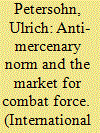

|
|
|
|
|
| Summary/Abstract |
Since 2013, combat services have been increasingly exchanged on the market. This development is puzzling since the practice emerged despite an anti-mercenary norm banning such services, and without any revision of the norm. The article argues that the combat market is not a deliberate design, but the result of strategic interaction. For some, compliance with the anti-mercenary norm is the best strategy, while for others, violating the norm is best. However, once the norm violation occurs, it is in the interest of all actors to maintain a façade of compliance. Non-compliant actors benefit from the combat services, and compliant actors do not have to engage in costly sanctioning of the norm violation, and avoid the reputational costs associated with non-enforcement. The article employs game theory to investigate the strategic interactions of actors across eleven combat contracts from 2013 to 2019.
|
|
|
|
|
|
|
|
|
|
|
|
|
|
|
|
| 2 |
ID:
178323


|
|
|
|
|
| Summary/Abstract |
In the years following the Severe Acute Respiratory Syndrome (SARS) outbreak in 2002–2003, the World Health Organization (WHO) created a new system for global disease outbreak surveillance. The system relied on timely reporting by nation-states and gave the WHO a leading role in the global response. It also recognized the value of a multiplicity of sources of information, including from open-source media scanning. The post-SARS system faced its most significant task with the outbreak of the COVID-19 pandemic in the People’s Republic of China and its rapid spread in 2020. The WHO architecture for early warning of disease outbreaks arguably failed and gives rise to questions about how the international community can better respond to pandemic threats in future. This article explores the inter-connectedness of Canada’s system for global health surveillance, featuring the work of the Global Public Health Intelligence Network and that of the WHO, and argues that, while Canada has positioned itself as a global leader, much work needs to be done in Canada, and globally, if the concept of collective health security and shared early warning is to be maintained in the future.
|
|
|
|
|
|
|
|
|
|
|
|
|
|
|
|
| 3 |
ID:
178329


|
|
|
|
|
| Summary/Abstract |
A “connected battlespace” (CB) aims to leverage emerging technologies, such as low Earth orbit satellites, internet of things devices, cloud computing, and artificial intelligence, in order to collect, process, and disseminate large quantities of data in real time, thereby providing decision-makers with the ability to respond to threats faster and with more precision. Despite its promise, as a concept, a CB is still misunderstood, underdeveloped, and understudied. In an effort to fill this gap, this policy brief describes several key findings derived from an expert stakeholder workshop that the authors convened in July 2020. Workshop participants probed several questions about the development of Canada’s CB infrastructure, touching on a number of themes, including alliance partnerships, emerging technology, procurement, national security, and defence strategy. Our article synthesizes and analyzes key discussions held during this workshop.
|
|
|
|
|
|
|
|
|
|
|
|
|
|
|
|
| 4 |
ID:
178321
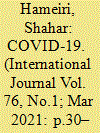

|
|
|
|
|
| Summary/Abstract |
Lockdowns and border closures to manage the ongoing COVID-19 pandemic have caused the greatest global economic shock since the Great Depression. Does this also signal the end of economic globalization, the most significant trend of the past forty years? And if so, what kind of global political economy is emerging from the wreckage? In this article, I argue that COVID-19 is mainly intensifying pre-existing trends, set in motion by the global financial crisis of 2008 and the People’s Republic of China (PRC)’s economic rise. The disruptions to global supply chains wrought by COVID-19 have combined with rising United States–PRC rivalry, growing disaffection with the distributional impacts of global value chains, and automation to catalyze the turn away from globalized production. Meanwhile, amid the economic doom and gloom, financial markets are booming, high on the central banks’ liquidity injections to which they have been addicted since the 2008 crisis. As in the decade since the 2008 crisis, booming markets will likely deepen inequality and resentment, fuelling economic nationalism and eroding support for globalization even more. The governments of relatively small and open economies, such as Australia and Canada, will need to guide their economies more purposefully or find themselves at the mercy of the increasingly confrontational, yet domestically fragile, United States and the PRC.
|
|
|
|
|
|
|
|
|
|
|
|
|
|
|
|
| 5 |
ID:
178319
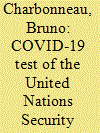

|
|
|
|
|
| Summary/Abstract |
The United Nations Security Council (UNSC) has failed the COVID-19 test, unable to promote or facilitate multilateral cooperation in dealing with the outbreak. This is worrying given its relevance as a principal organ of the United Nations (UN) that could enable or constrain international cooperation and given the need for such cooperation in responding to the COVID-19 pandemic. The failure of the UNSC to respond adequately to the COVID-19 pandemic highlights the historical limits of the UNSC as a forum for international cooperation. It also suggests that highlighting and debating UNSC reforms are not sufficient or even productive ways to move forward, especially in the context of the challenges that pandemics and climate change represent for global cooperation. It is far from clear if the UN system can change the global structures on which it was built. What does seem clear is that the UNSC is not where one will find the seeds of change for reimagining global order.
|
|
|
|
|
|
|
|
|
|
|
|
|
|
|
|
| 6 |
ID:
178327
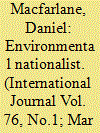

|
|
|
|
|
| Summary/Abstract |
Prior to 1945, General Andrew George Latta McNaughton had already made a name for himself as an army general, engineer, inventor, and cabinet minister. After 1945, McNaughton occupied a number of key international roles for Canada: at the United Nations, on the Permanent Joint Board on Defence, and on the International Joint Commission. Even though he became one of Canada’s most important diplomatic actors during the early Cold War period, this aspect of his career has been mostly ignored by international historians. This article examines McNaughton’s key involvement in the evolution of a number of Canada–US water megaprojects, arguing that his nationalism underpinned his approach to bilateral relations, which combined deep technical expertise with a willingness to publicly assert the Canadian national interest. McNaughton’s approach should be studied not only to better understand North American environmental diplomacy in the Cold War but also to draw from it several lessons for contemporary times.
|
|
|
|
|
|
|
|
|
|
|
|
|
|
|
|
| 7 |
ID:
178320


|
|
|
|
|
| Summary/Abstract |
The European Union (EU) has been strongly criticized from the outset for its alleged mismanagement of the COVID-19 pandemic which began early in 2020. Several observers even predicted the end of European integration. This article examines how the EU has been managing the crisis, with a focus on how this has impacted its external relations, notably with Canada. It will argue that this crisis, as is the case with most crises the EU has gone through, has brought to light existing ambiguities in European governance, but that it has not led to fundamental questions about the EU’s and its member states’ overall commitment to Europe’s “two-fold multilateralism” (i.e., internal and external collaboration). EU representatives have re-emphasized this principle when reiterating the need for both European coordinated actions as well as a global response to the COVID-19 pandemic, working closely with their partners, including Canada. Therefore, amid the evolving and serious health-related and economy-related challenges, the crisis offers an occasion for the EU to strengthen and deepen both its integration and its global role.
|
|
|
|
|
|
|
|
|
|
|
|
|
|
|
|
| 8 |
ID:
178322
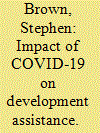

|
|
|
|
|
| Summary/Abstract |
This article analyzes the impact of the COVID-19 pandemic on foreign aid. Using examples from Canadian foreign aid, it argues that, despite the terrible toll it is exacting, the crisis has accelerated some significant positive pre-existing trends, both by destabilizing the perception of aid as flowing essentially from the Global North to Global South and by reinforcing awareness of the importance of joint efforts for global public goods and humanitarian assistance, as well as debt relief. However, it has also reinforced potentially harmful self-interested justifications for aid, which could align assistance more with donors’ priorities than the needs of the poor. An important trend reversal is the renewed emphasis on well-being. Two other crucial trends remain unclear—the COVID-19 pandemic’s impact on multilateral approaches and on aid flows. How donors respond to the COVID-19 pandemic and its aftermath over the next few years will depend on their political will, and will profoundly shape the future of development co-operation.
|
|
|
|
|
|
|
|
|
|
|
|
|
|
|
|
| 9 |
ID:
178325
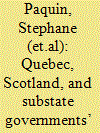

|
|
|
|
|
| Summary/Abstract |
Following Brexit (the withdrawal of the UK from the EU and the European Atomic Energy Community at the end of 31 January 2020), the British government stated that it hoped to reach a new trade agreement with Canada to be modelled after the Canada–EU Comprehensive Economic and Trade Agreement, the first free-trade deal for which Canadian provinces were directly involved at every stage of negotiations. In the UK, while there are mechanisms for the involvement of devolved regions in European policy, there is no clear constitutional doctrine as to the roles they should play in elaborating trade policy more generally. Moreover, the asymmetric nature of the UK’s devolution system complicates the involvement of its devolved governments in trade negotiations. By providing a specific focus on the cases of Quebec and Scotland, this article provides a comparison of substate governments’ roles in trade negotiation and trade promotion. It concludes that, while there seems to be only limited scope for substate governments’ formal input into future trade negotiations, their trade and investment promotion organizations allow them to pursue different objectives over trade outcomes within a unified national framework.
|
|
|
|
|
|
|
|
|
|
|
|
|
|
|
|
| 10 |
ID:
178324
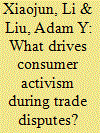

|
|
|
|
|
| Summary/Abstract |
What drives consumer activism during trade disputes? We investigate this important and timely question using a survey experiment in the context of the recent Canada–US trade dispute. We find that Canadians are more likely to express willingness to take punitive actions in the form of boycotting during a trade conflict when they learn that Americans are taking such actions (retaliation), when many fellow citizens are taking such actions (peer pressure), and when they are rallied by their government (elite cue). Among the three conditions, peer pressure has the largest effect. These findings contribute to our understanding of the microfoundations of consumer activism during international trade disputes. They also have important policy implications in a world where both protectionism and populism are rising.
|
|
|
|
|
|
|
|
|
|
|
|
|
|
|
|
| 11 |
ID:
178328


|
|
|
|
|
| Summary/Abstract |
Relations with the People’s Republic of China (PRC) will be the single biggest Canadian foreign policy challenge for the foreseeable future. The trajectory of bilateral relations will be shaped, above all, by US–PRC strategic competition. Canadian views on the PRC are defined by a litany of problems in the current relationship, with relatively little reflection on the broader and longer-term problématique. This article, adapted from a November 2020 speech to the Canada–China Friendship Society of Ottawa, proposes a reconceptualization of the PRC as Canada's “global neighbour.” On virtually all the issues that matter to Canada, the PRC is in our neighbourhood, and we are in the PRC’s, whether we like it or not. The article offers five principles for the conduct of relations with Beijing—emphasizing the importance of independence in Canadian foreign policy in the context of a Sino–US great power conflict that is likely to persist for decades.
|
|
|
|
|
|
|
|
|
|
|
|
|
|
|
|
|
|
|
|
|